- Last Updated: February 16th, 2026
Key Takeaways
PFAS contamination at military bases primarily originates from firefighting foams, leading to persistent contamination in groundwater, soil, air, and indoor environments that pose significant exposure risks to military personnel and their families.
Exposure to PFAS has been linked to serious health effects, including thyroid dysfunction, elevated risk of various cancers like thyroid cancer, and immune system effects. Scientific studies have demonstrated a correlation between PFAS exposure and increased incidence of thyroid cancer.
Victims of PFAS-induced thyroid cancer can file lawsuits on legal grounds such as product liability, negligence, and failure to warn. TruLawsuit Info offers expert guidance on a contingency fee basis with instant case evaluations to help plaintiffs maximize compensation.
Overview of PFAS Thyroid Cancer Lawsuit
On this page, we’ll provide an overview of the PFAS thyroid cancer lawsuit, links between PFAS exposure and thyroid cancer, how to file a PFAS thyroid cancer lawsuit, and much more.
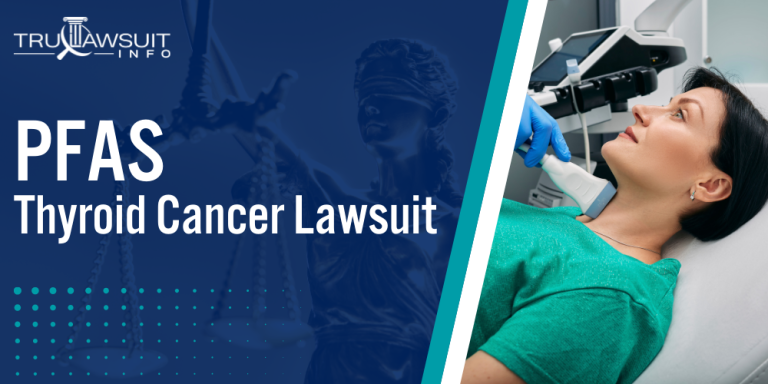
Intro to PFAS Thyroid Cancer Lawsuit
Key aspects of the PFAS thyroid cancer lawsuit include:
- Legal Grounds for Lawsuits: Victims can file lawsuits on grounds such as product liability, negligence, and failure to warn. Previous PFAS settlements have provided significant financial compensation for affected individuals.
- PFAS Contamination Sources: Contamination at military bases primarily originates from the use of aqueous film-forming foam (AFFF) in firefighting, leading to persistent contamination in groundwater, soil, air, and indoor environments.
- Health Risks: PFAS exposure is linked to serious health effects, including thyroid dysfunction, increased risk of thyroid cancer, and immune system effects.
If you or a loved one has developed thyroid cancer or any other severe health conditions after being exposed to PFAS chemicals at a military base, you may be eligible for compensation.
Contact TruLawsuit Info using the chat on this page to receive an instant case evaluation to see if you qualify to file a PFAS thyroid cancer lawsuit.
PFAS Contamination and Exposure Risks at Military Bases
Per- and polyfluoroalkyl substances (PFAS) are a group of man-made chemicals widely used in various industrial and consumer products.
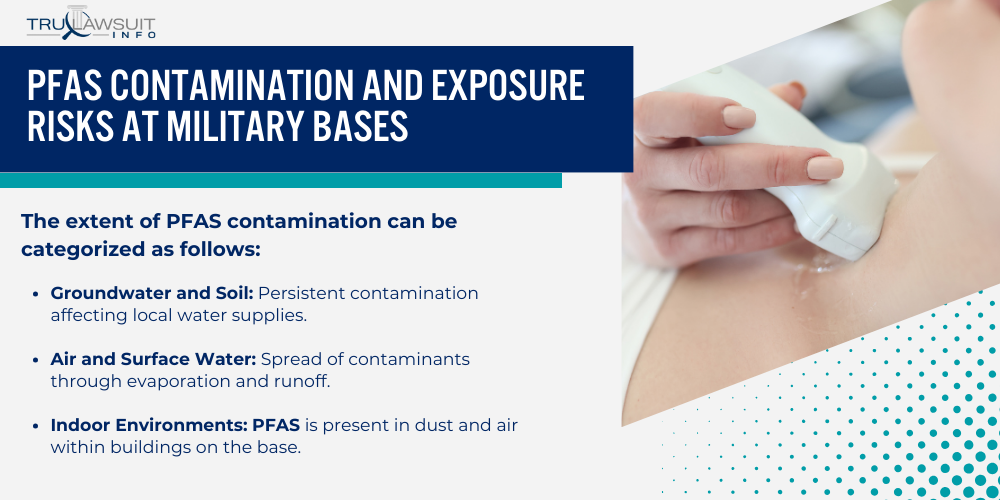
Military bases are among the most significant sites for widespread PFAS contamination due to the extensive use of firefighting foam containing these chemicals.
The presence of toxic PFAS chemicals in soil and groundwater poses substantial exposure risks to military personnel and their families.
Sources and Extent of PFAS Contamination at Military Bases
PFAS contamination at military bases primarily results from the use of aqueous film-forming foam (AFFF) in firefighting training exercises and emergency responses.
These foams contain high levels of PFAS, which can leach into the environment over time.
The extent of PFAS contamination can be categorized as follows:
- Groundwater and Soil: Persistent contamination affecting local water supplies.
- Air and Surface Water: Spread of contaminants through evaporation and runoff.
- Indoor Environments: PFAS is present in dust and air within buildings on the base.
These contamination sources lead to long-term environmental and health concerns for those living and working on military bases.
Health Risks Associated with PFAS Exposure in Military Environments
Exposure to PFAS in military environments has been linked to various adverse health impacts.
Military personnel and their families are at risk of developing serious health conditions due to prolonged exposure to contaminated water and soil.
Health risks associated with PFAS exposure include thyroid dysfunction, which increases the likelihood of developing thyroid cancer.
There is also an elevated risk of various cancers, including thyroid cancer and kidney cancer, and immune system effects, such as reduced efficacy of vaccines and increased susceptibility to infections.
Continued monitoring and research are crucial to fully understand the scope of health impacts posed by PFAS exposure at military bases.
Impact of PFAS Exposure on Military Personnel and Families
The impact of PFAS exposure on military personnel and their families is profound, affecting their human health and well-being in multiple ways.
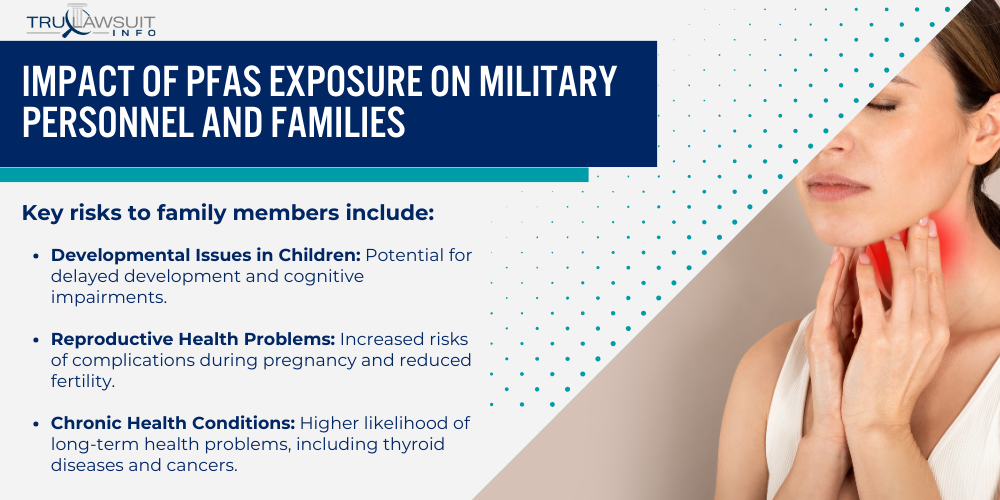
Often referred to as “forever chemicals” due to their persistence in the environment and the human body, PFAS contamination at military bases poses a significant risk to both current and former military members and their families.
This section explores the specific effects of PFAS exposure on military personnel and the risks to family members living near contaminated bases.
Effects of PFAS Exposure on Military Personnel
Due to the nature of their duties and prolonged presence on contaminated bases, military personnel are particularly vulnerable to PFAS exposure.
The health effects can be severe and long-lasting, impacting their overall quality of life and ability to serve.
Increased cancer risk, particularly thyroid disease, endocrine disruption leading to thyroid dysfunction, and immune system impairment causing decreased vaccine effectiveness and increased infection rates are some of the primary health issues faced by military personnel.
These negative health effects not only affect their personal health but also their professional performance and readiness.
Risks to Family Members Living Near Contaminated Bases
Family members residing on or near contaminated military bases are also at risk of PFAS exposure through various environmental pathways.
This exposure can have significant health implications, especially for vulnerable groups like children and pregnant women.
Key risks to family members include:
- Developmental Issues in Children: Potential for delayed development and cognitive impairments.
- Reproductive Health Problems: Increased risks of complications during pregnancy and reduced fertility.
- Chronic Health Conditions: Higher likelihood of long-term health problems, including thyroid diseases and cancers.
The presence of PFAS in household water supplies and environmental surroundings necessitates urgent attention to mitigate these adverse health outcomes.
Links Between PFAS Exposure and Thyroid Cancer
The link between PFAS exposure and thyroid cancer has garnered significant scientific interest in recent years.
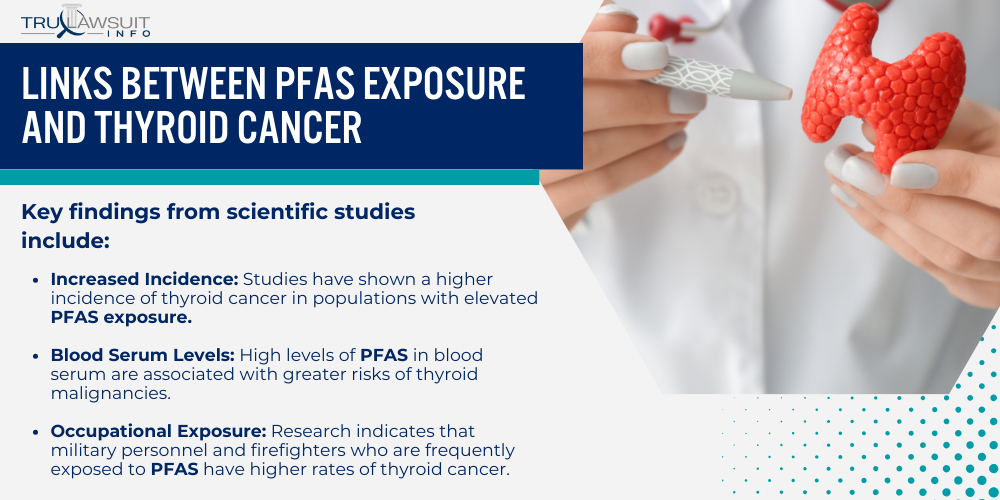
Numerous studies have investigated how these harmful chemicals interact with the human body, particularly focusing on their potential to induce cancerous growths in the thyroid gland.
This section explores the scientific studies that have established this link and the mechanisms by which PFAS may contribute to thyroid carcinogenesis.
Scientific Studies Linking PFAS to Thyroid Cancer
Several scientific studies have demonstrated a correlation between PFAS exposure and an increased risk of thyroid cancer.
Researchers have found that individuals with higher levels of PFAS in their blood are more likely to develop thyroid disorders and cancers.
Key findings from scientific studies include:
- Increased Incidence: Studies have shown a higher incidence of thyroid cancer in populations with elevated PFAS exposure.
- Blood Serum Levels: High levels of PFAS in blood serum are associated with greater risks of thyroid malignancies.
- Occupational Exposure: Research indicates that military personnel and firefighters who are frequently exposed to PFAS have higher rates of thyroid cancer.
These studies provide compelling evidence for the carcinogenic potential of PFAS, particularly in relation to thyroid cancer.
Mechanisms of PFAS in Thyroid Carcinogenesis
The mechanisms by which PFAS contributes to thyroid carcinogenesis are complex and multifaceted.
PFAS chemicals can interfere with thyroid hormone regulation and disrupt normal cellular functions, leading to cancerous changes.
PFAS are known to bind to proteins and accumulate in the thyroid gland, where they can alter hormone production and signaling pathways.
This disruption can lead to the growth of malignant cells and the development of thyroid cancer.
Additionally, PFAS have been shown to induce oxidative stress and inflammation, further contributing to carcinogenic processes.
Understanding these mechanisms is essential for developing effective prevention and treatment strategies for those affected by PFAS exposure.
Legal Basis for PFAS Thyroid Cancer Lawsuits
The legal basis for PFAS thyroid cancer lawsuits is grounded in the principles of tort law, specifically focusing on product liability, negligence, and environmental contamination.
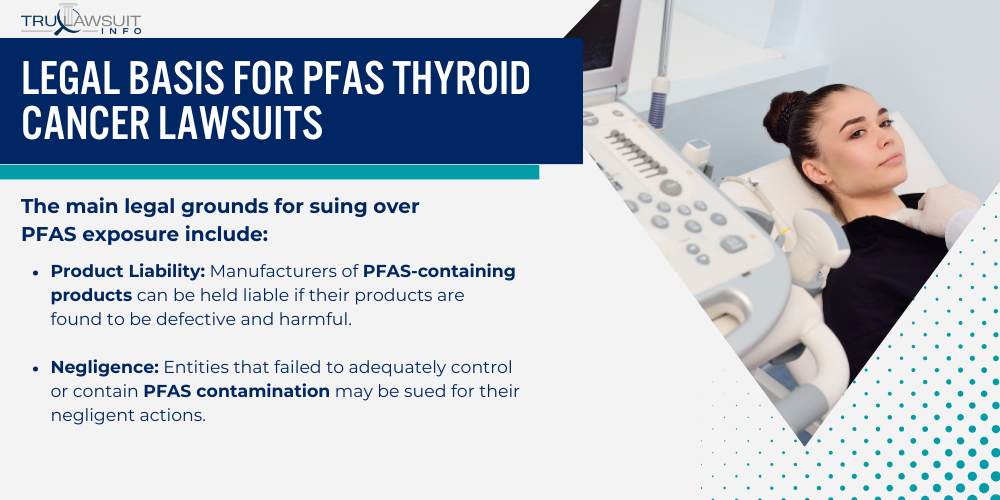
Victims of PFAS exposure who develop thyroid cancer have the right to seek compensation for the harm caused by these toxic substances.
This section outlines the legal grounds for suing over PFAS exposure and reviews previous lawsuits and their outcomes.
Legal Grounds for Suing Over PFAS Exposure
Individuals affected by PFAS exposure can file lawsuits on several legal grounds.
These include product liability, negligence, and failure to warn.
The main legal grounds for suing over PFAS exposure include:
- Product Liability: Manufacturers of PFAS-containing products can be held liable if their products are found to be defective and harmful.
- Negligence: Entities that failed to adequately control or contain PFAS contamination may be sued for their negligent actions.
- Failure To Warn: Companies that did not provide sufficient warnings about the dangers of PFAS exposure can be held accountable for the associated health risks that result.
These legal grounds provide a foundation for affected individuals to seek justice and compensation for their injuries.
Previous PFAS Lawsuits and Their Outcomes
Numerous PFAS lawsuits have been filed in recent years, resulting in various outcomes.
Some cases have led to significant financial settlements, while others have prompted regulatory changes and increased awareness of PFAS-related health risks.
Notable outcomes of previous PFAS lawsuits include large PFAS lawsuit settlements with chemical manufacturers, compensation for affected individuals, and the establishment of medical monitoring programs.
These outcomes highlight the importance of holding responsible parties accountable and provide precedents for future litigation.
How to File a PFAS Thyroid Cancer Lawsuit
Filing a PFAS thyroid cancer lawsuit involves several critical steps to ensure that the PFAS claim is properly documented and presented.
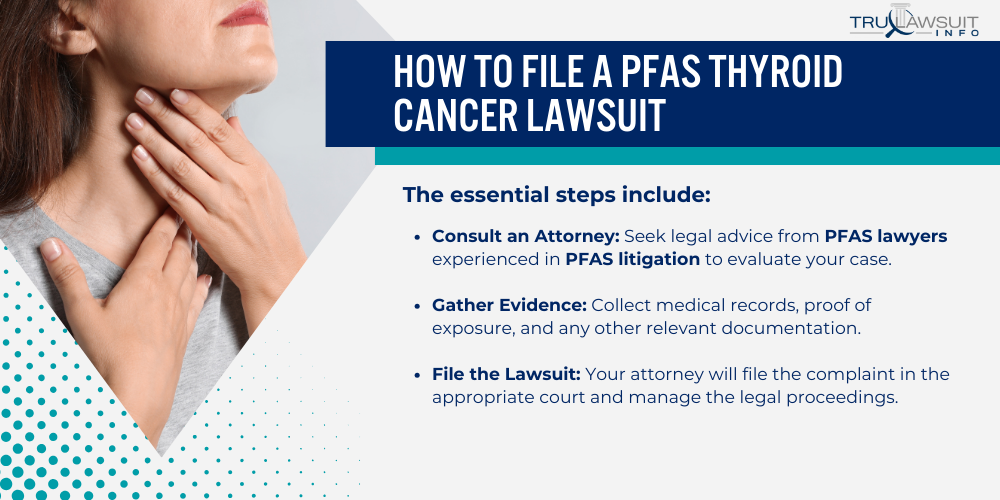
Affected individuals need to gather substantial evidence and follow legal procedures to maximize their chances of a successful outcome.
This section details the steps to take when filing a PFAS thyroid cancer lawsuit and the essential evidence and documentation required.
Steps to Take When Filing a PFAS Thyroid Cancer Lawsuit
Filing a PFAS thyroid cancer lawsuit requires careful planning and adherence to legal processes.
The initial steps involve consulting with a specialized attorney, gathering evidence, and filing the necessary legal documents.
The essential steps include:
- Consult an Attorney: Seek legal advice from PFAS lawyers experienced in PFAS litigation to evaluate your case.
- Gather Evidence: Collect medical records, proof of exposure, and any other relevant documentation.
- File the Lawsuit: Your attorney will file the complaint in the appropriate court and manage the legal proceedings.
Following these steps ensures that your case is well-prepared and has a solid foundation for legal action.
Evidence and Documentation for a PFAS Thyroid Cancer Lawsuit
Successful PFAS thyroid cancer lawsuits rely heavily on comprehensive evidence and documentation.
This evidence supports the claim that PFAS exposure caused thyroid cancer and justifies the demand for compensation.
Important evidence includes medical records detailing the diagnosis and treatment of thyroid cancer, proof of PFAS exposure (such as water testing results and military service records), and expert testimonies linking PFAS exposure to the cancer diagnosis.
Collecting thorough and detailed documentation strengthens the case and increases the likelihood of a favorable outcome.
Challenges and Defenses in PFAS Lawsuits
PFAS thyroid cancer lawsuits can be complex, often involving various legal and scientific challenges.
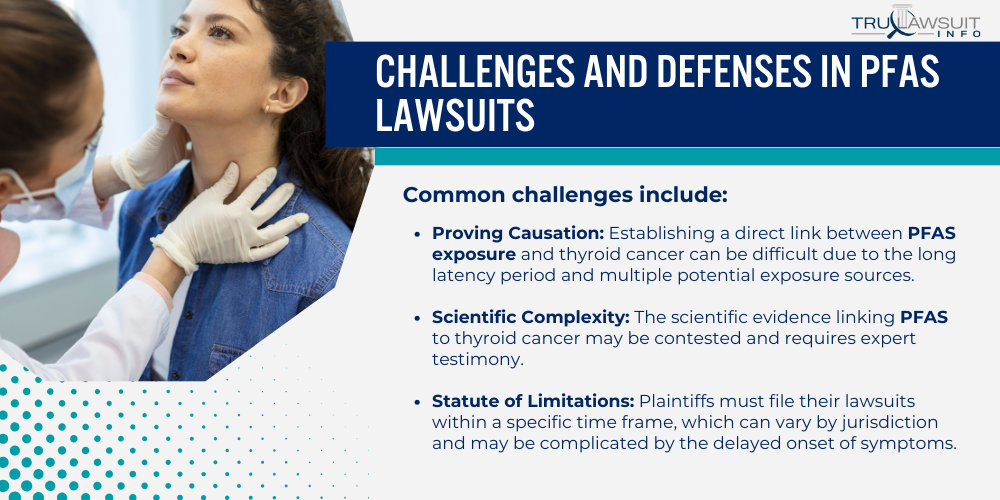
Plaintiffs must navigate these obstacles to build a compelling case against manufacturers and other responsible parties.
This section discusses the common challenges faced in PFAS thyroid cancer lawsuits and the potential defenses used by PFAS manufacturers.
Common Challenges Faced in PFAS Thyroid Cancer Lawsuits
Filing a PFAS thyroid cancer lawsuit involves overcoming several significant challenges.
These challenges can complicate the legal process and affect the outcome of the case.
Common challenges include:
- Proving Causation: Establishing a direct link between PFAS exposure and thyroid cancer can be difficult due to the long latency period and multiple potential exposure sources.
- Scientific Complexity: The scientific evidence linking PFAS to thyroid cancer may be contested and requires expert testimony.
- Statute of Limitations: Plaintiffs must file their lawsuits within a specific time frame, which can vary by jurisdiction and may be complicated by the delayed onset of symptoms.
Successfully addressing these challenges is crucial for plaintiffs seeking justice and compensation.
Potential Defenses Used by PFAS Manufacturers
PFAS manufacturers often employ various defenses to counter lawsuits and minimize their liability.
Understanding these potential defenses can help plaintiffs and their attorneys prepare stronger cases.
Manufacturers may argue that the plaintiff’s thyroid cancer was caused by factors other than PFAS exposure, such as genetic predisposition or other environmental exposures.
They might also challenge the validity of scientific studies linking PFAS to thyroid cancer or claim that they complied with existing regulations and industry standards at the time of PFAS use.
Additionally, they may invoke statute limitations to argue that the lawsuit was filed too late.
Countering these defenses requires robust evidence and expert testimony to substantiate the claims of PFAS-induced thyroid cancer.
Future of PFAS Regulation and Legal Actions
The future of PFAS regulation and legal actions is likely to see significant developments as awareness of the health risks associated with these chemicals continues to grow.
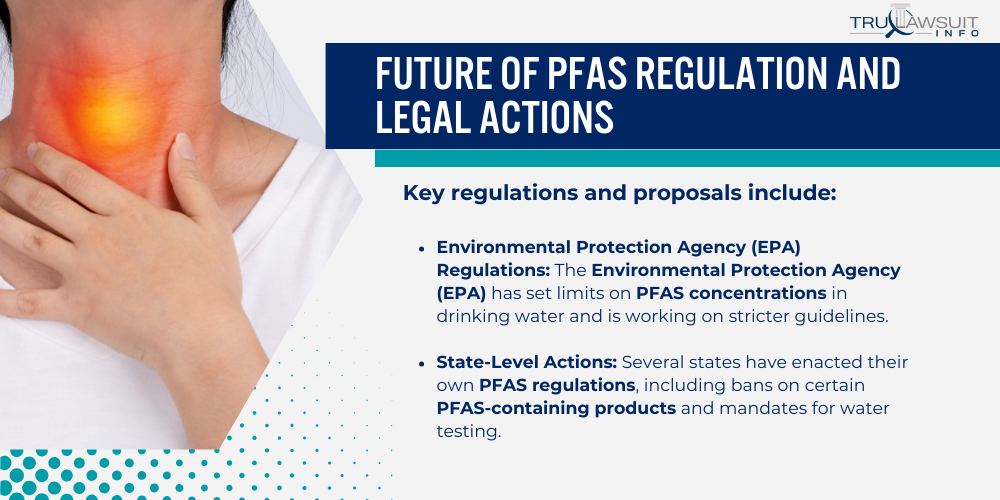
Regulatory agencies and lawmakers increasingly focus on addressing PFAS contamination and holding manufacturers accountable.
This section explores current and proposed regulations on PFAS and future trends and legal developments in PFAS litigation.
Current and Proposed Regulations on PFAS
Regulatory agencies have begun implementing and proposing measures to reduce PFAS contamination and protect public health.
These regulations are critical in managing the widespread impact of PFAS and ensuring safer environments.
Key regulations and proposals include:
- Environmental Protection Agency (EPA) Regulations: The Environmental Protection Agency (EPA) has set limits on PFAS concentrations in drinking water and is working on stricter guidelines.
- State-Level Actions: Several states have enacted their own PFAS regulations, including bans on certain PFAS-containing products and mandates for water testing.
- International Efforts: Countries around the world are also developing regulations to control PFAS production and usage, aligning with global environmental and health standards.
These regulatory efforts are essential steps toward reducing PFAS exposure and preventing further contamination.
Future Trends and Legal Developments in PFAS Litigation
The landscape of PFAS litigation is evolving, with increasing numbers of lawsuits and more comprehensive legal strategies.
Future trends in PFAS litigation are expected to focus on holding more entities accountable and expanding the scope of legal actions.
As scientific evidence linking PFAS to various health conditions strengthens, we can anticipate a rise in individual and PFAS class action lawsuits.
Legal strategies will likely become more sophisticated, with plaintiffs’ attorneys leveraging new research and expert testimony to build stronger cases.
Additionally, there may be greater collaboration between federal and state agencies to address PFAS contamination comprehensively.
These trends suggest that PFAS litigation will continue to grow, potentially leading to more substantial settlements and regulatory changes.
TruLaw: Maximizing Your PFAS Lawsuit Settlement
Maximizing the success of your PFAS thyroid cancer lawsuit requires strategic legal representation and a thorough understanding of the types of compensation available.
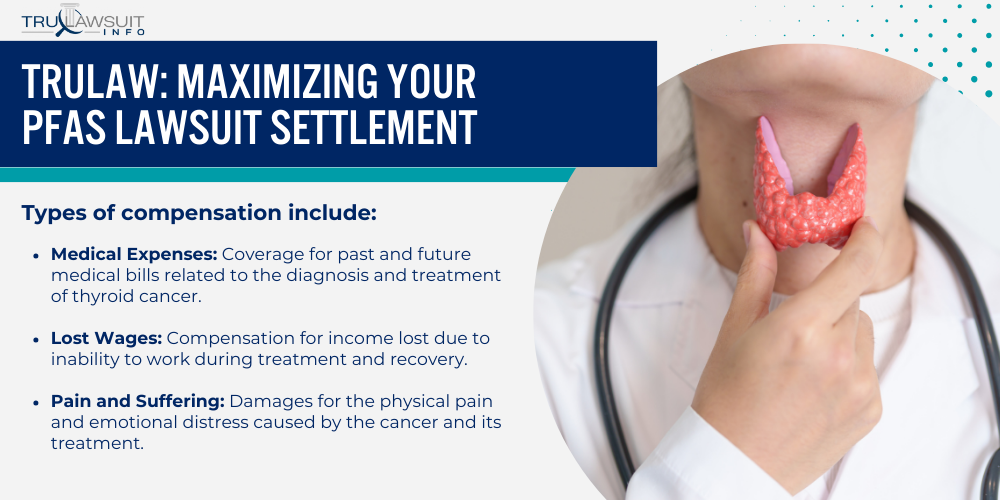
TruLaw offers expert guidance and resources to help plaintiffs achieve the best possible outcomes.
This section outlines the types of compensation available for PFAS thyroid cancer victims and explains the benefits of a contingency fee basis with instant case evaluation.
Types of Compensation Available for PFAS Thyroid Cancer Victims
Victims of PFAS thyroid cancer are entitled to various types of compensation to address the physical, emotional, and financial impact of their condition.
Understanding the full scope of compensation can help plaintiffs seek adequate redress for their suffering.
Types of compensation include:
- Medical Expenses: Coverage for past and future medical bills related to the diagnosis and treatment of thyroid cancer.
- Lost Wages: Compensation for income lost due to inability to work during treatment and recovery.
- Pain and Suffering: Damages for the physical pain and emotional distress caused by the cancer and its treatment.
- Punitive Damages: In cases of egregious misconduct by manufacturers, additional damages may be awarded to punish the responsible parties.
This comprehensive compensation aims to alleviate the burden on victims and provide them with the necessary support.
Contingency Fee Basis: Instant Case Evaluation
TruLaw operates on a contingency fee basis, which means clients do not pay any upfront fees for legal services.
Instead, attorneys receive a percentage of the settlement or award only if the case is successful.
This approach ensures that legal representation is accessible to all victims, regardless of their financial situation.
The process begins with an instant case evaluation, where potential plaintiffs can quickly determine the viability of their lawsuit.
TruLaw’s experienced attorneys review the case details, assess the evidence, and provide guidance on the best course of action.
This initial evaluation helps victims understand their legal options and the potential for a successful outcome, ensuring they can make informed decisions about pursuing litigation.
Frequently Asked Questions
-
While several class action lawsuits related to PFAS have occurred in the past, multidistrict litigation (MDL) centralized in the District of South Carolina is currently consolidating lawsuits related to PFAS contamination across 20 different federal district courts.
-
PFAS contamination at military bases primarily originates from the use of aqueous film-forming foam (AFFF) in firefighting training exercises and emergency responses.
These foams contain high levels of toxic chemicals, which can leach into the environment over time.
-
Military personnel and their families are at significant risk of developing serious health conditions due to prolonged exposure to PFAS-contaminated water and soil.
The health effects can be severe and long-lasting, including increased cancer risk, thyroid dysfunction, and immune system impairment.
-
Several scientific studies have demonstrated a correlation between PFAS exposure and an increased risk of thyroid cancer.
Researchers have found that individuals with higher levels of PFAS in their blood are more likely to develop thyroid disorders and cancers.
-
Individuals affected by PFAS exposure can file lawsuits on several legal grounds, including product liability, negligence, and failure to warn.
These legal grounds provide a foundation for affected individuals to seek justice and compensation for their injuries.
-
Victims of PFAS thyroid cancer are entitled to various types of compensation, including coverage for medical expenses, lost wages, pain and suffering, and, in some cases, punitive damages.
This comprehensive compensation aims to alleviate the burden on victims and provide them with the necessary support.

Attorney Jessie Paluch, founder of TruLawsuit Info, has over 25 years of experience as a personal injury and mass tort attorney, and previously worked as an international tax attorney at Deloitte. Jessie collaborates with attorneys nationwide — enabling her to share reliable, up-to-date legal information with our readers.
Legally Reviewed
This article has been written and reviewed for legal accuracy and clarity by the team of writers and legal experts at TruLawsuit Info and is as accurate as possible. This content should not be taken as legal advice from an attorney. If you would like to learn more about our owner and experienced injury lawyer, Jessie Paluch, you can do so here.
Fact-Checked
TruLawsuit Info does everything possible to make sure the information in this article is up to date and accurate. If you need specific legal advice about your case, contact our team by using the chat on the bottom of this page. This article should not be taken as advice from an attorney.
You can learn more about the PFAS Contamination Lawsuit by visiting any of our pages listed below:
Here, at Tru Lawsuit Info, we’re committed to helping victims get the justice they deserve.
To do this, we actively work to connect them with attorneys who are experts in litigating cases similar to theirs.
Table of Contents
Tru Lawsuit Info is a reliable source of information about issues that may affect your health and safety, such as faulty products, data breaches, and environmental hazards.
Our team of experienced writers collaborates with medical professionals, lawyers, and advocates to produce informative articles, guides, and other resources that raise awareness of these topics.
Our thorough research provides consumers with access to reliable information and updates on lawsuits happening around the country. We also can connect consumers with attorneys if they need assistance.
Here, at Tru Lawsuit Info, we’re committed to helping victims get the justice they deserve.
To do this, we actively work to connect them with attorneys who are experts in litigating cases similar to theirs.
